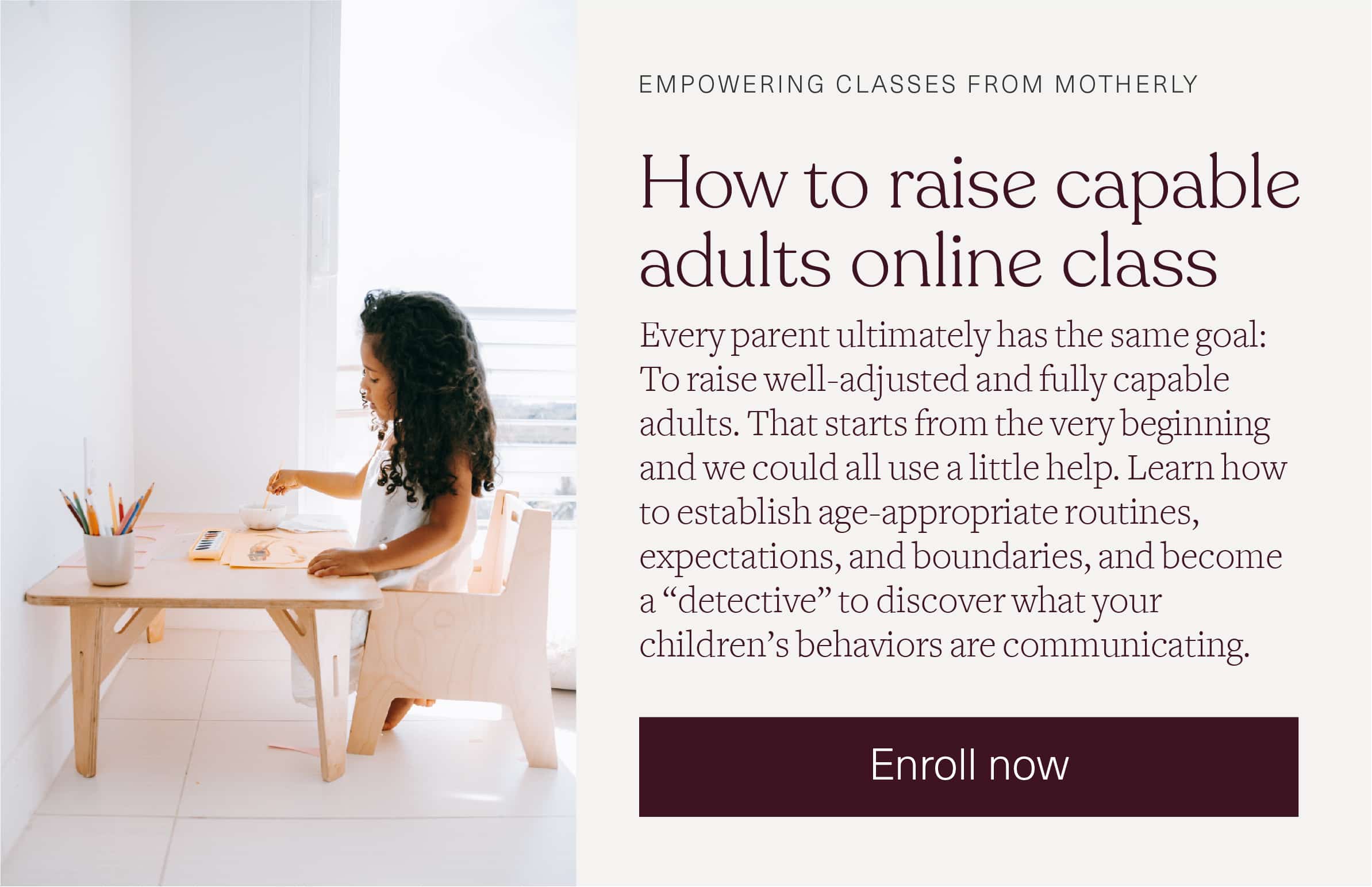

Feel like your 8-year-old is playing with dolls one second and talking back the next? It may not feel great, but it’s perfectly normal. While parents mentally prepare themselves for the terrible twos or secretly dread the idea of their sweet baby becoming a teenager, parenting an 8-year-old may feel like the hardest age to parent because it can come as a surprise that things aren’t smooth sailing between kindergarten and early teen years.
Your child’s personality, temperament, and environment all come into play, of course, but a lot happens developmentally in the growing 8- or 9-year-old brain and body that contributes to this age-specific behavior. “Although school-age children are less physically demanding than little ones, their social and emotional challenges can be complex and difficult for parents to observe,” shares Dr. Marquita Davis, chief academic officer for KinderCare. Yay for sleeping through the night (hopefully), but now you’re dealing with bigger issues like cognitive development and understanding social norms.


What’s happening developmentally for children at this age? The world is opening up, and your child is getting ready to step out and explore their independence. “The early school-aged-years [specifically the ages of 8 and 9] mark a growth spurt both mentally and physically, and especially emotionally,” explains Mary Ann Little, PhD, clinical psychologist and author of multiple parenting books, including the forthcoming Childhood Narcissism: Strategies to Raise Unselfish, Unentitled, and Empathetic Children. “This growth spurt makes it a challenging time for children and also for their parents.”
Dr. Little shares that 8-year-olds make big cognitive leaps as they develop more advanced language, math, and writing skills. “They are working on understanding cause and effect and how things work,” she says, “Morals and values are also beginning to develop.” At the same time, motor skills advance, and even though they aren’t necessarily going through puberty yet (although it can happen early), they become more conscious of their growing bodies.
The third piece, emotional development, means kids are experimenting with independence and learning who they are. “They experience a growing desire to belong to a group and to find their place in the social order, whether in school, church or athletics. For this reason, social exclusion is more painful,” Dr. Little says.
In other words, 8- and 9-year-olds are navigating the world in entirely new ways, pushing their parents as they assert their independence. “Many report increased stubbornness or disagreeableness,” shares Dr. Little. As they experiment with autonomy, you can expect your child to be extra sensitive, demanding and more difficult.
blogherads.adq.push(function(){ blogherads.defineSlot(‘flexrec’, ‘ad_div_in_body_2’).setTargeting(‘targetingKey’, ‘targetingValue’).display(); });
Sometimes, knowing a phase is normal and will eventually pass can ease anxiety. But there are strategies parents can employ to help make this pre-tween phase go a little more smoothly.
First step? Patience. It may take a few deep breaths, but understanding that your child is in the middle of a developmental transition can help you keep cool and respond rather than react. “It’s hard to be an 8- or 9-year-old who wants to be a grown-up on the one hand and needs a hug at the same time,” says Dr. Little. You may need to reach back into the toolkit you used with your toddler, empathizing with your child’s big feelings and emotions that require a little extra love.
We know social media isn’t great for children’s mental health, but Dr. Little explains that social media may even influence “tween” behavior earlier than expected. “One factor that may make the life of an 8- and 9-year-old more complicated and, ultimately, more difficult, is growing up in a world with more powerful social media and pervasive cultural influence.” She explains that it can be challenging for 8- or 9-year-olds to compare themselves to their peers and social norms at this vulnerable age. Skip social media ideally, or have agreed-upon guidelines and open conversations about what your child sees online.
Dr. Davis believes it’s essential to coach and guide your child so they can learn to problem-solve and regulate their emotions. “Help your child learn to identify and manage their fast-evolving emotions, a critical skill that will serve them well for life.”
She also suggests parents work with their children to create age-appropriate household responsibilities. At the same time, you can foster independence by letting them try to choose their own clothing or allowing them to spend more time with friends outside of school. “This allows children the opportunity to explore their new-found desire for individuality in a safe environment.”
Your child needs support and boundaries even as they roll their eyes and test limits. Dr. Davis sums it up perfectly: “It’s hard to be a child at this stage in the same way that it’s hard to be their parent.” Plus, as you work on communication and trust at this age, you’ll create a solid foundation for your relationship as you move into the tween and teen years (and beyond).
Mary Ann Little, PhD, is a psychologist and author of the forthcoming book “Childhood Narcissism: Strategies to Raise Unselfish, Unentitled, and Empathetic Children.”
Marquita Davis, PhD, is chief academic officer at Kindercare.
blogherads.adq.push(function(){ blogherads.defineSlot(‘flexrec’, ‘ad_div_in_body_1’).setTargeting(‘targetingKey’, ‘targetingValue’).display(); });
Original Article Source | Author
If you purchase an independently reviewed product or service through a link on our website,… Read More
Summer is the perfect time for a little reinvention — or at least a minor… Read More
Summer always has a magical quality about it, but the summer solstice is especially mystical.… Read More
Do you know someone who has had an emotional affair, or whose partner had one… Read More
If there’s anything every mom can relate to, it’s the feeling that you’re always doing… Read More
The conversation started when one of my co-workers popped into our team Slack chat to… Read More